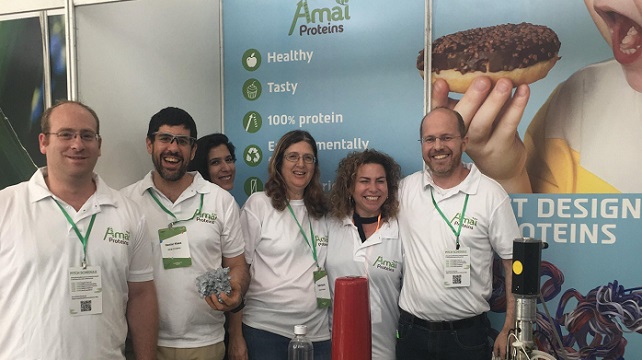Amai Proteins is an Israeli startup developing new sugar substitutes. Amai means sweet in Japanese.
Everybody wants to be able to eat whatever they want without the consequences. Calories free sweets that really do taste like the real thing and are sugar-free.
With increases in the rate of diabetes in the west due to poor diets and the increasing consumption of junk food the development of a tasteful and healthy sugar alternative is more important than ever.
Will you offer us a hand? Every gift, regardless of size, fuels our future.
Your critical contribution enables us to maintain our independence from shareholders or wealthy owners, allowing us to keep up reporting without bias. It means we can continue to make Jewish Business News available to everyone.
You can support us for as little as $1 via PayPal at office@jewishbusinessnews.com.
Thank you.
And everybody wants good tasting sugar substitute. The problem with the ones currently available on the market is that they never taste like the real thing. Many people find their taste to be awful. And they are not entirely healthy for you.
There is also the unwanted side effect of causing people to actually eat more carbs. Because some work by tricking the brain into thinking that you are tasting something sweet, when drinking things like diet sodas you might find yourself craving pretzels or chips.
This is one reason why so many Israeli startups are today working on the development new sugar substitutes. One such firm is the food-tech startup DouxMatok, which creates a new targeted delivery of flavor ingredients. The company boasts that its new sugar substitutes and salt products enable healthier consumption of foods without compromising taste.
DouxMatok develops flavor delivery technologies while improving the nutritional profile of food products. The company holds 24 granted patents and boasts that its sugar reduction solution maximizes the efficiency of sugar delivery to the sweet taste receptors and enhances the perception of sweetness, enabling substantial sugar reduction without compromising taste, mouthfeel, or texture.
Last November, Scientists from the Hebrew University in Jerusalem said that they came up with a plan for a realistic alternative to sugar. Dr. Amiram Goldblum, a Professor Emeritus of Computational Medicinal Chemistry at the Hebrew University of Jerusalem School of Pharmacy – Institute for Drug Research, developed an algorithm, Iterative Stochastic Elimination (ISE), which he said could be used to find sugar substitutes.
Some companies are finding ways to make fruit juices truly healthy for you by dealing with their sugar problem. Better Juice, Ltd. is an Israeli startup which has a technology to reduce all sugars from natural juices.
–
So, what does Amai Proteins do? Founded in 2016, Amai says that it fixes our food system one protein at a time. The first focus are Hyper-sweet designer proteins as a sugar substitute that is “healthy, zero-calorie, GMO-free, sustainable, affordable, food-compatible, tasty, product-fit and novel.” The proteins are designed via an Agile-Integrative Computational Protein Design (AI-CPD) platform and produced by precision fermentation biotechnology, just like one brews beer.
Last month, Dr. Ilan Samish, founder and CEO of Amai Proteins, explained what they do in an interview with DeliveryRank. “Amai Proteins was created to design novel proteins for the mass food market,” said Samish. “Our first innovation is the world’s only healthy, tasty, cost-effective, and thermostable sweetener – and this is the first time a brand has ever been able to connect these words together when talking about such a product.”
“The idea of designing novel proteins came about because 99.99% of all proteins found in nature are intrinsically not stable,” he explained. “Our bodies (and any organism, for that matter) need to dispose of the proteins in our tissue at a relatively fast pace. However, the mass food market demands proteins that won’t “live” in their natural environment, but in very harsh conditions – at high temperatures, high acid levels, under intense amounts of light, etc.”
He also told Ctech, “Unlike with pharmaceuticals, we can’t make millions of different variants. In foodtech, we can only test very few, since we have to work with the human tongue human tongue can taste a very complex flavor profile which no high throughput machine can replicate yet is limited by the number of samples it can taste. Thus, the number of different samples we can test is very limited. Currently, we have an expert sensory panel with 20 test-tasters, and about 35 different sample variants.”




